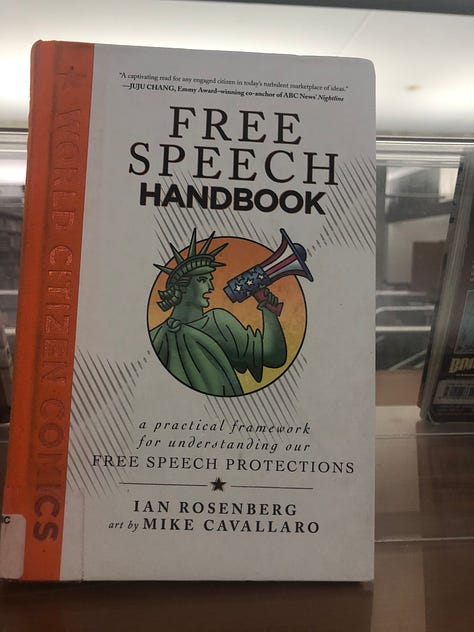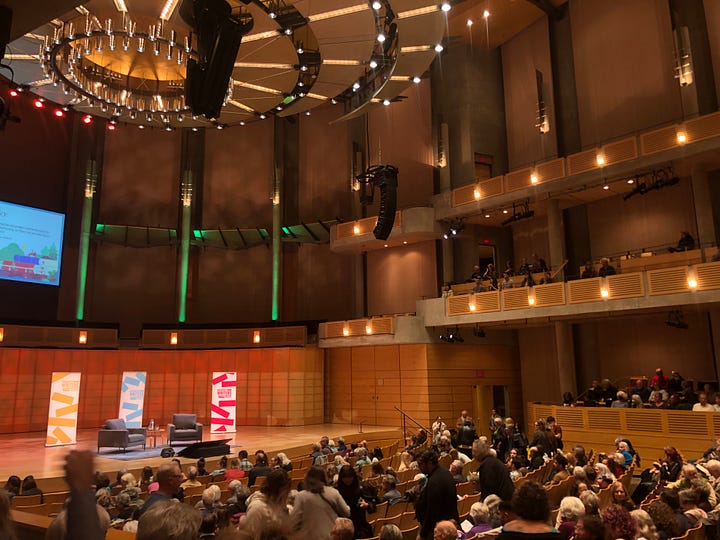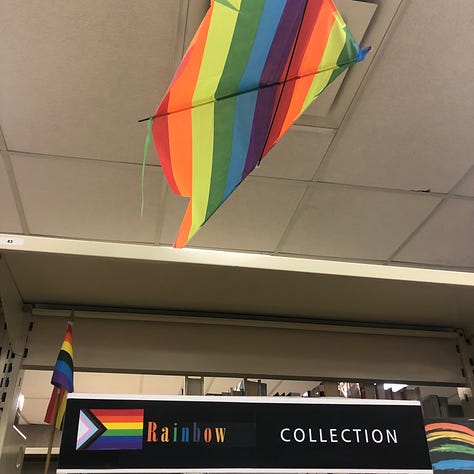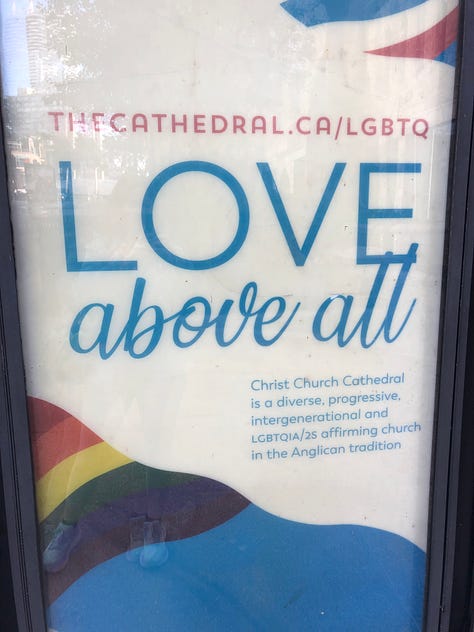"The canary in the coal mine... Book banning and book challenging is a starting place for worse things to come." Canada Substack edition
Librarians on Canada's "liberal" west coast are now said to be spending their days combing through books for hate speech. Meanwhile book challenges and bans have spread to Australia and the UK.



Schools from one province banning ALL the books in the library before 2008 because, well, just in case. It sounds like a story from Uganda or Russia, right?
Wrong. This happened in supposedly liberal Canada. Last year, I spent three months in Vancouver. (I am fortunate enough to be half-Canadian). About a year to the date, I was also lucky enough to go to a few Vancouver Writers Fest (VWF) sessions, including one fascinating but terrifying discussion on book bans in Canada. Yes, it turns out that this phenomenon which I thought had been contained to the US had seeped across the border.
And since I wrote this piece below earlier this year for Index on Censorship magazine, which was picked up by The Bookseller, there’s been book bans in Australia and the UK.
Since it was a year ago and since this is becoming such an alarming trend around the world and likely to only worsen in the US, Canada and Australia with elections and potential leadership changes there, and since I haven’t written much about my time in Canada, I thought I would republish this here with some bonus photos from Beautiful British Columbia (BC). And some tips on what you can do about book bans anywhere.
When Canadian non-binary and queer author Ronnie Riley discovered they’d been “shadow banned” last November they were horrified. But it was a matter of sooner rather than later.
“I felt absolutely horrible, but I knew it was a possibility,” said the Toronto-based writer, who spent several years trying to get their debut novel aimed at middle graders, Jude Saves the World, published. In the book, 12-year-old protagonist Jude Winters is non-binary and has ADHD. “I’ve experienced my share of transphobia and queerphobia, but this was particularly heartbreaking,” said Riley. “Connecting with kids is one of the reasons most ‘kidlit’ authors write, and being denied those opportunities because of queerness is outrageous. It’s queerphobic. Homophobic. Transphobic.”
“Shadow banning” is a broad definition usually attributed to social media posts, describing the limiting of a particular user’s content without their knowledge. Riley’s discovery came via a leaked memo on Reddit that they then saw on social media. According to the circular, the Waterloo Catholic District School Board (WCDSB), about 95km outside Toronto, had decided to place books that were part of the Forest of Reading (FoR) programme but “don’t align with the Family Life curriculum” in the professional (Pro) section, where they are not immediately available to students.




The board added that “before JK [junior kindergarten] Grade 6 students may borrow these books from the library, a teacher must provide the Catholic context because students haven’t been instructed in the Family Life curriculum yet”. Jude Saves the World was one of four works targeted from the FoR programme.
When I contacted WCDSB this January, the organisation’s senior manager of communications, Lema Salaymeh, told me that all FoR titles have since been reclassified as fiction or picture books, adding: “This reclassification is part of our larger initiative to review the books catalogued in the Pro section. This effort will be conducted in tandem with our ongoing, scheduled review of our Library Collection Development Administrative Procedure, ensuring our collection remains dynamic and inclusive. By making these changes, we hope to create a more welcoming and diverse environment for all our students, including those who identify as 2SLGBTQIA+.”
This re-classification of books came after a co-ordinated pushback by the FoR, Scholastic Canada, The Writers’ Union of Canada and others. Unlike in the US, where book challenges are regular and well-documented, not as much data on book challenges and bans is available in the more liberal Canada. But as part of an “aggressive” response to censorship, a library challenges database is now in its early stages of creation, thanks to the Centre for Free Expression at Toronto Metropolitan University, and so far it contains more than 600 entries, according to centre director James L Turk. The records start in 2010 and include books that have attracted complaints for perceived violence, illegal behaviour, sexism, racism against indigenous people, age inappropriateness and anti-Christian content. While most targeted items have stayed on the shelves, many have been relocated.



In Canada, the growing problem “should be seen as the canary in the mine metaphor – that book banning and book challenging is a starting place for worse things to come,” Jen Ferguson, a Michif/Métis and white author and activist warned an audience at Vancouver Writers Fest in October. “In the US, I have no rights over my reproductive system, which is f****ing bananas,” said Ferguson, who now lives in Iowa. The challenges in the US are part of a “wave of fascism” involving fights that “mostly we’ve won” in Canada. But the writer added: “For the non-readers this is a sign of things to come. I think that’s why we need to care, all of us, and why we need to organise.”
Richard Beaudry, co-ordinator of the University of British Columbia’s Teacher-Librarianship programme, who has equipped librarians to deal with book challenges for the past two decades, said that there was no doubt that bannings had increased in Canada. In February 2023 in Calgary, Alberta, a preacher stormed a drag queen storytime event in a library, with bystanders saying he shouted “religious jargon” and transphobic slurs. He was arrested and charged with hate-motivated crimes. Three months later, in Manitoba, the Brandon School Division rejected a call to remove books on sexuality and gender identity, including titles such as It’s Perfectly Normal, an illustrated book by Robie H Harris for 10-year-olds and above which explores puberty and sex.
In September, some schools in Peel, Ontario, even removed all books published before 2008 – including the Harry Potter and Hunger Games series – as part of an “equity-based book weeding process” undertaken by the Peel District School Board, aimed at making sure library books were inclusive. It was immediately halted by Ontario education minister Stephen Lecce, who didn’t respond to my requests for comment.
Peel District School Board told me that it follows “library weeding guidelines set by the Canadian School Libraries Association” which direct it to keep books “relevant to the student population, inclusive, not harmful, and support the current curriculum from the Ministry of Education”. It said the guidelines also “[direct] teacher-librarians to consider weeding books that may be misleading, ‘ugly’ [in poor condition], superseded, trivial, irrelevant, and elsewhere easily available”.
While most challenges are never successful, they still cause harm. “You’re killing a little piece of the literary ecosystem, doing it out of view,” said Brendan de Caires, executive director of PEN Canada. He highlighted that those demanding the bans were targeting relatively new authors such as Riley, who are “low-hanging fruit” in their eyes.
With elections lined up in Canada for 2025, book bans are likely to increase. After nearly a decade in power, Liberal prime minister Justin Trudeau is tipped to lose to Conservative leader Pierre Poilievre. The populist, who backed the 2020 Freedom Convoy protesting vaccine mandates, is favoured by groups behind the bans such as Liberty Coalition Canada, Save Canada and Parents for Parents’ Rights, according to Turk. None of these groups responded to requests for comment. “The threats to intellectual freedom are coming from all sides, and everyone bringing them is well intentioned in their own mind, even if their behaviour is reprehensible in the rest of our minds,” Turk said.
In Canada, most of these organisations instigating book challenges are relatively small and inspired by Judeo-Christian principles. Miramichi Freedom Warriors, which last year distributed thousands of photocopies of a library’s “requests for reconsideration” forms to fundamentalist Christian churches, created more challenges for the New Brunswick Public Library Service in four months than in the entire history of public libraries in the province, Turk said.
The largest and best-funded network behind the potential bans is Action4Canada, which has “taken the game plan of Moms for Liberty”, said Beaudry. Inspired by the sophisticated political operatives who receive huge sums of money from right-wing US foundations, the self-described “grassroots movement” was launched in British Columbia by Tanya Gaw and Valerie Price. They now claim to have nearly 100 chapters across the country.
Vehemently opposed to the Sexual Orientation and Gender Identity programme (SOGI 123) introduced in British Columbia in 2016, Action4Canada’s tactics include a “notice of personal liability”, which they encourage individuals to send to their local libraries. It claims that books are violating the Canadian Criminal Code on child pornography, warning that people could be charged and jailed. The network’s “urgent actions” include petitions to ban SOGI 123 and a library appearance by drag queen Freida Whales in Kelowna, a city in the province. Action4Canada did not respond to repeated requests for comment.
Queer Canadian author Robin Stevenson described them as “very much following that American playbook – ‘Let’s get Conservatives elected to school boards. Let’s challenge books. Here are the lists of books you should object to’”. One recent talk Stevenson scheduled was open to a whole Canadian school board but just one class attended. “The teacher told me her colleagues were too nervous about parents complaining so they didn’t include their classes,” she said, adding that there is a reluctance to put queer books on the shelves: “Librarians are telling me that they’re buying my book but they’ll keep it in the counsellor’s office.”
Stevenson added that there was also a “hesitancy to invite queer authors to schools in the first place”, as they wanted to avoid backlash. This ultimately costs LGBTQ+ authors, who make a large part of their living from these talks, Jen Ferguson told the VWF.
In the supposedly tolerant east side of Vancouver, librarians are today flipping through young adult novels to look for hateful and harmful comments, Jen Ferguson warned the audience at the VWF, recounting a conversation with a librarian. The Vancouver Public Library, however, said it had no evidence of this.
Perhaps one of the biggest prices will be the “unwritten books”, added de Caires. “You can’t even see consequences [of bans] until you have a decade of books not being written because the people who would have written them have been scared off.”
At the VWF, Ferguson stressed that “those of us who are furious about book banning and book challenging, we’re just slightly less organised” than those demanding the bans. For fellow panellist Winnipeg-born trans author Casey Plett, there’s a silver lining: “This is something that you can solve.”
For the CFE, it has meant arming people with information about each challenge – what’s being targeted, why and how – via its database, plus creating profiles of previously challenged books to be ready for “wild claims”. The CFE has been encouraging all libraries to add to the list. “[Librarians] have never historically treated a tweet or an email as a challenge,” said Turk, adding that getting them to understand this had been tricky. While he said public libraries in Canada had mostly been “the absolute strongest defenders of intellectual freedom”, the pressures in schools was different. Other than in British Columbia, most don’t have teacher-librarians, often leading to “terrible positions” adopted by school boards.
Turk added: “We have to do a lot of public education about this, talking about why [just] because you don’t like something or you find it offensive, that’s not grounds to say that nobody else can see it.”
But the resistance movement is gaining ground, with Beaudry saying that Canada is picking up the pace against censorship. He points to specialised work against book challenges from the intellectual freedom committee at the Canadian Federation of Library Associations, and said that in the last elections, almost everybody who ran as a trustee against the SOGI programme and LGBTQ+ books in schools was not elected. And of all the authors I spoke to, every single one said they would remain defiant and refuse to be silenced.



What can you do about book banning?
Check out We Need Diverse Books, it has advice on how to approach book challenges and bans.
Get organised. One of the VWF panelists that I saw speak last year said that unfortunately those calling for the bans are slightly more organised than those opposing them, albeit only. But you can get more organised! In Australia, check out Equality Australia and sign up to their alerts. I signed a book ban petition through them. The Index on Censorship piece on what’s happening in the UK is worth a read.
Support new authors, because as mentioned in my story above, they’re “low-hanging fruit”.
Although book bans are not actually about books, reading or literature as stressed, you should of course still support libraries and independent book stores if you can.
The state of Illinois actually banned book banning, so others can take a leaf out of theirs, so to speak. And maybe we should all go to Chicago and buy books, as was suggested at the VWF? (Might be a bit extreme).
You can see another article that I wrote on book bas for an Australian outlet here featuring Canadian author Christy Jordan-Fenton. And also on the issue of freedom of expression in Canada, you can see a piece that I wrote on the murder of a Sikh activist here, and a story on their inspiring press agency here.
Here’s a travel story that I wrote inspired by Vancouver here. Oh and speaking of one of the “world’s most liveable” cities, I have an Airbnb horror story from “Van” coming soon. But for the time being you can read this piece that I wrote on why we’re all getting sick of Airbnb.
Canada is not perfect, but it’s really lovely. Here’s some more highlights below.









Thanks for the quote marks around the word "liberal"! Censorship to (allegedly) protect readers from information they should not have access to (because it might not yet be orthodoxy, etc.) has a long history:
“The very magnitude of the power over men’s minds that a highly centralised and government-dominated system of education places in the hands of the authorities ought to make one hesitant before accepting it too readily.” - Professor F. A. Hayek, The Constitution of Liberty, Routledge and Kegan Paul, London, 1960, p. 379
“A general State education is a mere contrivance for moulding people to be exactly like one another: and the mould in which it casts them is that which pleases the predominant power in the government, whether this be a monarch, a priesthood, an aristocracy, or the majority of the existing generation; in proportion as it is efficient and successful, it establishes a despotism over the mind …” - John Stuart Mill, On Liberty, 1859.
“… when innovations creep into their games and constant changes are made in them, the children cease to have a sure standard of what is right … There can be no worse evil … Change … is most dangerous …” - Plato (429-347 B.C.), The Laws, Book VII, 360 B.C.
Mainstream media would shut down the internet to "protect" people from potential "error". It's all Stalinist censorship, made plain by Orwell's "1984", and especially Machiavelli's "The Prince":
“It ought to be remembered that there is nothing more difficult to take in hand, more perilous to conduct, or more uncertain in its success, than to take the lead in the introduction of a new order of things. Because the innovator has for enemies all those who have done well under the old conditions, and lukewarm defenders in those who may do well under the new. This coolness arises partly from fear of the opponents, who have the laws on their side, and partly from the incredulity of men, who do not readily believe in new things until they have had a long experience of them.”
This attitude encourages the mainstream media or "liberals" to censor anything that debunks their agenda.
I live in Vancouver so always enjoy reading things where people mention it and their thoughts on it!